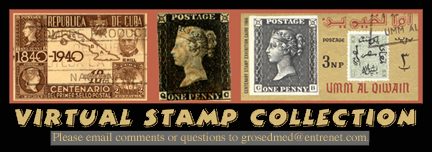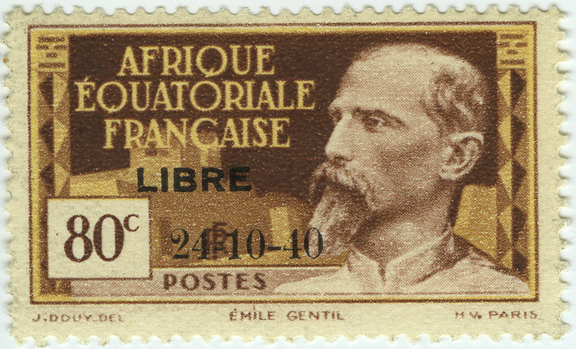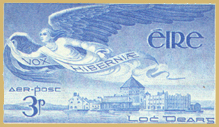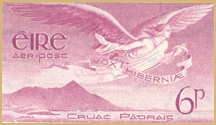|
  
French Equatorial Africa
24-10-40 Overprint Commemorating
the Arrival of General de Gaulle

Definitive issue of 1937-1940 overprinted 24-10-40
In 1940 four values of the French Equatorial Africa definitive issue of 1937-1940 were overprinted 24-10-40 to commemorate the arrival of General de Gaulle in Brazzaville, the capital of Free France.
The stamps were sold on post cards and a premium was charged to cover the price of the cards.
A year later, an American collector wrote to Free French officials seeking stamps from the Free French authorities. Their response to his request resulted in the following article Lawrence Journal-World from October 22, 1941:
SEES FREE FRENCH SPIRIT IN AFRICA
Letter Inspired by Short Wave Broadcast Brings Information
Editor’s Note: — Glenn Kappleman. 1447 Massachusetts. a freshman In K. U. heard a shortwave broadcast In June from the Free French radio station at Brazzaville. Africa, and immediately wrote the station asking for further information about the de Gaulle government, and requesting some Free French stamps for his collection. A few davs ago he received an appreciative replv from C. Desjardins Service De 1’lnformation, 1’Afrique Francaise Libre, enclosing: a complete series of Equatorial Africa stamps, and the following article written by K. E. Quicley, who signed his name as "Public Relations Chief. United States." Desjardins referred to Kappleman's letter as "showing the most intelligent interest of any of the many letters received from United States listeners."
By K. E. QUIGLEY
Three hundred and fifty miles up from the mouth of the Congo river, surrounded on every side by primi-tive forest land, lies the answer to a question that I have been asking mvself since that fateful June of 1940.
That answer is Brazzaville, the capital of Free French Africa.
After the collapse of the stagnant political system in France, the potential course of the French people became a great enigma.
I was in France at that time. There I had seen only the more obvious, the worst manifestations of the defeat... units of the army whose morale had been undermined . . . officers who were not completely competent... the activities of the ever-present fifth column. It was difficult to realize that these were only isolated cases and the impression they made on me at the time was strong. I saw little hope for France. I believed her future to be dead.
I was wrong. Free French Africa, overrun with fever, with sleeping sickness, with savage beasts, with fantastic insects, today contains a group of men who comprise what is probably the most idealistic army in modern history ... a group of men who have sworn to drive the invader from the homeland that lies thousands of miles away to the north. Those who compose this army have come from every sphere, arriving: by boat, by plane, by pirogue or on foot, after having passed thru country that is normally considered impassible. There are among them men of all creeds and religions, of all occupations, of all classes. They have come from the far-flung corners of the French empire, led unerringly bv a common ideal and by a quiet confidence in the man who leads all of them, Gen. Charles de Gaulle.
Today every implication that lies in the single word France is alive in this humid vaporous land that has been known for so long as the “White Man's Grave.”
The difficulties of life in this new land have been completely ignored and overcome by the men and women who continue the fight against Nazism. They have been overcome, not thru heroics, not thru flag waving, but thru a simple faith in the rights and liberties of all mankind. Here in what used to be called French Equatorial Africa the manifestations of young Free France are probably more visible than anywhere else in the world.
It was in this country only a little over a year ago that the first small group of the evergrowing supporters of the Free French movement rallied to the cause of De Gaulle. At that time they were not numerous, but the area they controlled was important
and enormous, stretching across the dark face of Africa for more than 2,000 miles and presenting 600 miles of coastline, forming a link in an allied chain that now extends from the Atlantic to the Red sea.
Today here in Brazzaville alone their number runs into thousands. Nearly everyone here is military. There are camps where tirailleurs, native troops who are volunteers, are trained to become self-support-ing units. There are camps for non-commissioned officers. There is the famous camp Colonna d'Ornano. Sandhurst of Free France, makeshift perhaps from the external point of view, but: turning out officers that are as fine as any to be found anywhere.
From time to time one sees a detachment of the famous French Foreign Legion pass thru bound for the northern front. These men, too, strangers to France, coming from every part of the world, feel that they must do their part to help stem the tide that is trying to engulf us.
And rising simultaneously with the Free French movement are those services which are a necessary adjunct to any nation in modern war. Where Brazzaville was formerly equipped with only a Morse transmitting station, there is today the well-known Radio Brazzaville, the Voice .of Free France. Behind the station itself is the force that directs its splendid work—an efficient and growing information service.
Today the information service of Free France is successfully en¬gaged in disseminating to the four corners of the earth those facts and news dispatches that concern the Free French forces. In addition to the many features intended pri¬marily for the French, the service comprises a separate public rela¬tions department that covers the United States, a special broadcast for Great Britain and Canada, and a tentative schedule that calls for both radio and press work for all the Spanish and Portuguese speak¬ing countries.
This is a picture of Brazzaville, but it could easily be a picture of all Free French Africa. This terri¬tory is honeycombed with just such sights. The official figure of the number of troops now serving un¬der the flag of Free France has been given by General de Gaulle as 55,000. If the appearance of things
here is any indication there are many more than that.
During the campaign in France. I was in close association with all types of Frenchmen. I met many who were fine but these men have risen far above those others, far above what they themselves were before June, 1940. Something has been added to their characters that has made them quiet, cryptic, con-fidently idealistic in a more mature sort of way. They are interested in only one thing—the preservation of the France that lies today in the interstice between oblivion and re-demption. There are those among them now who are under sentence of death at home . . . there are those whose families have been sold into Germany because sons and husbands are here. ... If the war by any chance went against Britain and the allies none of these men would ever see France again. But these are thoughts, which if
they enter into their minds at all are not spoken of. For them there is but a single solution to the plethora of problems that have entered into their daily life. France must become France again.
They are fighting to gain that end.
Bibliography
"French Equatorial Africa." Standard Postage Stamp Catalogue. 1997.
Quigley, K.E. "SEES FREE FRENCH SPIRIT IN AFRICA." Lawrence Journal-World. 22 Oct. 1941:3.
Direct comments, questions and corrections to:
stampquestions@hotmail.com
© Grose Educational Media, 2006-2016
|






